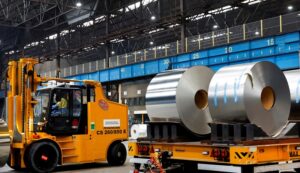Apple has undertaken extraordinary measures to circumvent the steep tariffs imposed by President Donald Trump on Chinese imports, airlifting approximately 1.5 million iPhones from India to the United States. This strategic move reflects the company’s efforts to mitigate the impact of a 125% tariff on Chinese goods, which would significantly raise production costs and consumer prices for its flagship products. By ramping up production in India—where tariffs are comparatively lower at 27%—Apple aims to diversify its supply chain and maintain competitive pricing in one of its largest markets.
The airlift operation involved transporting 600 tons of iPhones via chartered cargo flights from India to major U.S. cities. Apple reportedly spent months lobbying Indian airport authorities to expedite customs clearance times, reducing them from 30 hours to just six hours through a “green corridor” arrangement. This logistical effort underscores the urgency of Apple’s plan to stockpile inventory before tariffs potentially force price hikes on U.S. consumers. The company has also extended shifts and added workers at its Indian manufacturing facilities to boost production by 20%.
Analysts warn that if tariffs remain in place, iPhone prices in the U.S. could surge by hundreds of dollars, with some models potentially increasing by as much as $350. This would exacerbate concerns for consumers already grappling with high smartphone costs. Apple’s reliance on China for approximately 90% of its iPhone production has made it particularly vulnerable to the trade conflict between the U.S. and China. While India and Vietnam have emerged as alternative manufacturing hubs, scaling production outside China remains a complex and time-intensive process.
The broader implications of Apple’s airlift strategy highlight the challenges faced by multinational corporations navigating geopolitical tensions and trade policies. While this move may temporarily shield Apple from tariff-related price increases, it underscores the growing need for diversified supply chains in an era of economic uncertainty. As tariffs continue to reshape global trade dynamics, companies like Apple will likely face mounting pressure to innovate their sourcing and manufacturing strategies to remain competitive.
“Your donation helps us cover global events, ensuring everyone stays informed.”
(Source: The Express Tribune | CNBC | Fast Company)









